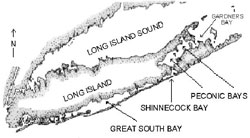You are here: Home › Stressors › Extreme Events › Harmful Algal Blooms › Feature Stories › Multi-agency Workshop Furthers Understanding of the Complex Science Surrounding the Prevention and/or Mitigation of Brown Tide Blooms.
Multi-agency Workshop Furthers Understanding of the Complex Science Surrounding the Prevention and/or Mitigation of Brown Tide Blooms.
 Brown tide blooms have occurred in coastal waters from Maryland to
Rhode Island. These episodic blooms have had serious impacts on benthic
seagrass habitat and the hard clam and scallop fisheries of the Peconic
Bay and Great South Bay systems of Long Island, NY. A one-day
workshop was held on November 29, 2005 in Yaphank, New York, to discuss
what is known about the causes of, and potential approaches to preventing
or mitigating, harmful blooms of the phytoplankton, Aureococcus
anophagefferens , in Northeast and Mid-Atlantic embayments. Workshop
participants represented the brown tide research community, the management
communities of New York State Department of Environmental Conservation,
Suffolk County Department of Health Services, the New York Seafood
Council, the Peconic Estuary Program, the South Shore Estuary Reserve
Office, the Nature Conservancy, the Maryland Department of Natural
Resources, the Delaware Department of Natural Resources, the US Geological
Survey, the US Fish and Wildlife Service, and the Environmental Protection
Agency. The research presented was largely supported through the Brown
Tide Research Initiative, a joint program of the Center for Sponsored
Coastal Ocean Research/Coastal Ocean Program and New York Sea Grant,
and the Ecology and Oceanography of Harmful Algal Blooms (ECOHAB). This workshop
will be followed by a Brown Tide Research Initiative Public Symposium
to be held on Monday, March 20, 2006, from 7-9 pm at Suffolk County Community College, in Riverhead, New York. The
symposium will inform interested stakeholders about what is known about
the causes of these blooms, and the science behind possible management
options. For more information, contact Susan
Banahan.
Brown tide blooms have occurred in coastal waters from Maryland to
Rhode Island. These episodic blooms have had serious impacts on benthic
seagrass habitat and the hard clam and scallop fisheries of the Peconic
Bay and Great South Bay systems of Long Island, NY. A one-day
workshop was held on November 29, 2005 in Yaphank, New York, to discuss
what is known about the causes of, and potential approaches to preventing
or mitigating, harmful blooms of the phytoplankton, Aureococcus
anophagefferens , in Northeast and Mid-Atlantic embayments. Workshop
participants represented the brown tide research community, the management
communities of New York State Department of Environmental Conservation,
Suffolk County Department of Health Services, the New York Seafood
Council, the Peconic Estuary Program, the South Shore Estuary Reserve
Office, the Nature Conservancy, the Maryland Department of Natural
Resources, the Delaware Department of Natural Resources, the US Geological
Survey, the US Fish and Wildlife Service, and the Environmental Protection
Agency. The research presented was largely supported through the Brown
Tide Research Initiative, a joint program of the Center for Sponsored
Coastal Ocean Research/Coastal Ocean Program and New York Sea Grant,
and the Ecology and Oceanography of Harmful Algal Blooms (ECOHAB). This workshop
will be followed by a Brown Tide Research Initiative Public Symposium
to be held on Monday, March 20, 2006, from 7-9 pm at Suffolk County Community College, in Riverhead, New York. The
symposium will inform interested stakeholders about what is known about
the causes of these blooms, and the science behind possible management
options. For more information, contact Susan
Banahan.

